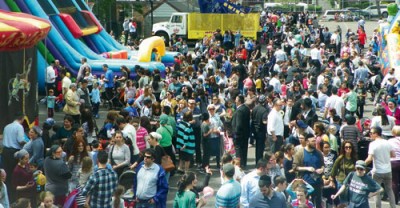
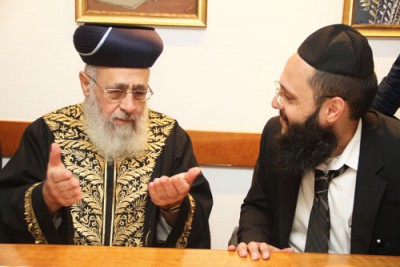
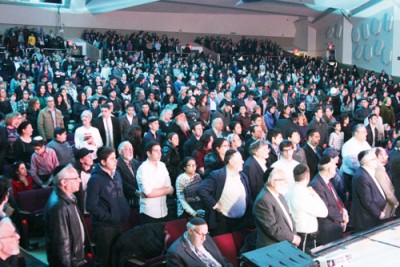
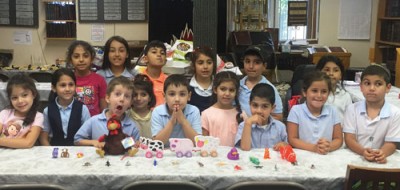
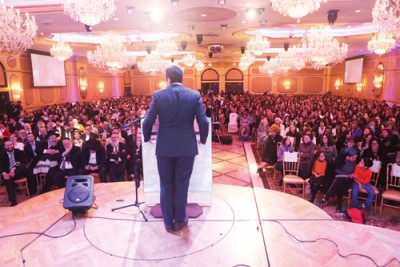
It humbly began eleven years ago in Queens and quickly became a global phenomenon. Today, the Chazaq organization is involved in all sorts of communal and social life not only in New York, but also in different parts of the world. How did the founders start and what kind of experiences did they face as their accomplishments grew? Their story is unusual in so many ways, mirroring their level of success at tackling issues that affect communities everywhere. Studying their account is studying a quiet revolution unfolding in everyone’s backyard. The following interviews were stylistically edited to share a tale of two brothers, Yaniv and Rabbi Ilan Meirov, who along with Yaniv’s wife Leora, made and continue to make all the difference.
Rav Ilan Meirov is Yaniv’s older brother, and amongst many other roles, guides the organization along the path of the Torah, which instructs Jews to help each other in every way possible.
BJL: Rav Ilan, Chazaq is a truly accomplished organization that has met a “supernatural” amount of success relative to its young age. You were there from the beginning with your brother, Yaniv. Please tell our readers how Chazaq’s beginning looked from your perspective.
Rav Ilan Meirov: The first thing I would like to stress about Chazaq is its unconventional beginning. Organizations are usually formed to address specific problems and usually come into existence after a meeting amongst community leaders and magnanimous donors. With Chazaq, we had totally the opposite. It began with a 14-year-old boy, my brother Yaniv, who was still in high school. At the time, he was living in Forest Hills and witnessed firsthand a lot of the troubles plaguing his fellow youth. This really bothered him, to the point that he felt that something must be done. His drive to move things became the spark that caught fire off the tailwinds of a small project I began in my teens.
I was around 19 years old and learning in Yeshivah Ohr HaChaim on Main Street in Kew Gardens Hills when a friend and I decided to pool our efforts for the sake of the community. He was a “speed-typist” and would type up my Hebrew Divrei Torah (Torah lessons) for distribution all around Queens. However, a year later, when we both got married, it became unworkable to continue, and unfortunately, our weekly paper came to an end.
Now, Yaniv - being the little brother who looked to change the world - was agitated that the paper had stopped. He decided to create his own format and started an English paper molded and even labeled after my paper.
BJL: What do you mean by “molded and labeled” after your paper?
Rav Ilan: It’s something I will never forget [R’ Ilan smiles]. At the time, I had no idea that Yaniv was up to anything. I came to shul one day and saw a parshah paper similar to the style I previously published, spread all around the tables. Naturally, I thought that someone seemed to take my idea and run with it; that was fine with me. What really shocked me was the nonsensical title “Poteach Et Yadeach.” I later realized that the intended title was the quote of the verse in Psalms, “Pote-ach Et Yadecha”; I felt that was really funny. All of a sudden I noticed the author was none other than me! Someone put my name on the paper as the author and I knew it must have been Yaniv. After that, we spoke, and I was so impressed with his sincere desire to keep the paper going that I decided to help him with his publications. That’s how the English Parsha Paper started. Who would’ve thought that from one small parshah paper such an unbelievable organization would develop? It truly is a miracle.
BJL: Yes, that really is remarkable! So from the parshah paper, what came next?
Rav Ilan: The next step was organizing events with renowned speakers to inspire the Queens community. A decade ago, if you wanted to enjoy a lecture, you needed to drive out to a different community. It seemed like nothing was taking place in Queens. So, the first speakers to join the project were Rabbi Eli Mansour, Rabbi Paysach Krohn, and Rabbi Zechariah Wallerstein. The super-successful events eventually evolved into a movement - and the rest is history. One of the interesting by-products of all this was a genuine unification of all the shuls and sub-communities in Queens. We took turns with each event’s venue and spread the events out among the different community shuls. We truly worked hard at uniting everyone to the best of our capabilities.
BJL: Today’s Chazaq looks a little different from the one described; it seems to have taken more tasks and responsibilities on its shoulders. How and why did Chazaq make the transition to the kind of organization it is today?
Rav Ilan: The truth is that the lectures we started were very nice. The hundreds of people who showed up to each class were satisfied, but it wasn’t enough to quench the great thirst that was revealed to us. The lectures were usually on Sundays, and nothing was really being done the rest of the week. Around the time Chazaq realized this gap, I was approached by Rabbi Emanuel Shimonov and community leader Mr. Simcha Elishayev regarding Beth Gavriel’s ebbing weeknight learning program. We decided to seize the opportunity, as this allowed us to have a nice bridge from the Sunday night lectures to nightly classes for men. This program had Russian, Hebrew, and English classes. We even had different levels of classes being offered within the same languages so that advanced students felt welcome too. Baruch Hashem, this learning program has become a springboard to so many men over the years. As this program rolled along, Yaniv decided to begin an adjacent women’s program, too, albeit on a smaller scale.
From there, we slowly but surely began addressing different groups and problems. As you can see today, we offer so many nuanced services; looking back, we didn’t really have such expectations. About a year or two into Chazaq’s operations, we finally began tackling the issue of Jewish kids attending public schools. We are happy to say that we have seen much success and continue to move from one thing to the next.
Me: It must be exciting to see so much success. Do you have any pointers for our readers on what it takes to get to Chazaq’s level of achievement?
Rav Ilan: In our case, the public really began experiencing our work - sometimes even with shock and reluctance. America is a beautiful, free country. The issue is that when children from good families don’t know how to handle the level of “freedom,” the trouble begins. Unfortunately, more and more families unaccustomed to these kinds of challenges succumbed to the times and didn’t know how to effectively deal with the ensuing complications and problems. How do you explain to a youngster that he is throwing away his invaluable heritage if he can’t reconcile it with modern values? Chazaq was there to help bridge the gap and relate to the younger generation, which didn’t or couldn’t resonate with the community’s traditional approach.
The community eventually came around to the fact that Chazaq was truly helping the youth retain their morals and values. We made this our main focus, to connect with the youth and help them. When the organization in its initial configuration reached a threshold, we decided to expand. I would like to mention by name attorney Isaac Abrahams, who helped push Chazaq into its modern form, which allowed us to expand even further. He helped set up a solid group of Board of Directors, which slowly grew to redefine Chazaq into what is today. The men and women who represent our organization are in essence the current and future leaders of our community. They are individuals who have a genuine concern for our community with absolutely no personal interest.
Thanks to their support and the support of the community at large, the Chazaq teen’s division alone services some 300 teenagers. So many lives are being changed; it’s truly remarkable. This is aside for the beautiful Shaping Lives Sunday program and the Yaldeinu after-school programs for public school children. Furthermore, in the last 14 months alone, our PSTY (Public School to Yeshiva) Division successfully transferred nearly 350 public school students to yeshiva - a truly unbelievable accomplishment! Nevertheless a lot more needs to be done. We must move forward day by day, and I, personally, marvel at how much has been accomplished until now. I see it as a portent of more good to come.
BJL: Do you have any final message you would like to pass on to our readers?
Rav Ilan: Yes, one more important message for now: unity, joint effort, and to never be satisfied with the status quo. We can never fold our hands and “take a nap.” We at Chazaq depend on and have always depended on the cooperation and support of the communities we work with and we must always strive to move forward together.
If we want to succeed and truly make a monumental difference for the betterment of our people, we all need to take part. That means feeling responsible for one another. I will share with you an applicable personal anecdote. After completing one of my sefarim (books), I took a trip to Israel to meet with Harav Yitzchak Yosef, the current Chief Rabbi of Israel, as he graciously agreed to assist me and guide me with my publications. After taking a look at the manuscript and writing me an approbation, he sent me to his father, Maran Harav Ovadia Yosef, of blessed memory. When I met with Maran, he took my manuscript in one hand and with the other, gave me a light slap. “Forget your personal accomplishments,” he said, “What are you doing for the community?” Only after I explained to him the progress we had with Chazaq did he look at my manuscript. I believe we can all learn from his priorities about putting the community first.
The truth is, you don’t need to be a rabbi to absorb this lesson. Doctors, lawyers, jewelers, and barbers all have the ability to involve themselves with the community. Some can give their time to help, others can get involved by supporting financially, and some can do a little of both. Refer your neighbors, their children, your children, and your friends to our programs if they can benefit in some way. We can reach as far as you send us. At the end of the day, Chazaq is not my organization, or the board members’ organization; it is your organization, your readers’ organization, and an organization for anybody who shares the same vision and aspirations. Tellingly, the only minor resistance we face today comes from those sectors that lose influence with the gradual betterment of the community. But we can’t let that bother us. We must all work hand in hand and make the world a better place; one person at a time.
Earlier I had the opportunity to interview Yaniv and Leora Meirov. They are the power couple working tirelessly to bring Chazaq to new levels and places for the benefit of all Jews around the world.
BJL: Yaniv and Leora, please tell our readers how Chazaq started and what Chazaq means to you.
Leora: Well, Chazaq started before I married Yaniv, but I hear that since he was a little kid he always wanted to do good in the world. He noticed a lot of things growing up, and the sense of sadness he felt from other people helped him decide to uplift the community. Baruch Hashem, by nature, he is a very positive person and wants to spread happiness. Besides that, his motto is “Let’s bring Moshiach!” Whatever can be done to help the Jews realize their potential was fair game.
In September of 2005, Rav Ilan saw Yaniv’s conviction and began helping him with his English parshah paper.
Exactly one year after the commencement of the English paper, the brothers decided to organize a shiur for the benefit of the community.
Yaniv: We organized a shiur with Rabbi Eli Mansour and expected a few dozen people to show up. What we didn’t expect and what actually happened was that over 500 people showed up to that event! After this turnout, we knew we just had to continue. There was just unbelievable demand. From that point on, we began organizing classes for the community. By December of that year, we came up with the name Chazaq. What you see today really truly began with a parshah paper and one lecture.
Leora: At a certain point, Yaniv and his brothers got together and brainstormed the name Chazaq. Rabbi Ilan actually put the “Q” in the name, for Queens. “Chazaq” in Hebrew means “strong,” and the idea was to strengthen the Queens community. Of course, today, Chazaq has spread well beyond Queens.
BJL: That’s remarkable. How did you know such interest existed? We’re talking about starting an organization devoted to the community. How did you measure demand?
Yaniv: The emails, phone calls, and crowds. All of Queens was abuzz with talk of the parshah paper and the various events. This powerful beginning moved us forward; we were ready for the next step. In truth, we never planned that Chazaq would evolve into the great organization it Baruch Hashem is today. Everything just happened to be. It was as if G-d was holding our hands and leading us on from one project to the next. We began distributing CDs, and translating the parshah papers into Russian and Hebrew to satisfy demand. We then started separate divisions for men, women, teens, children, and public school students. One thing just led to another, a snowball effect.
BJL: You’re now tracing Chazaq’s evolution into a social organization. Beginning with a teen’s division, afterschool programs, and eventually even a Yeshiva placement division, Chazaq really picked up the community mantle.
Yaniv: We are always ready to take on more responsibilities for our people.
BJL: How about yourselves? Chazaq has now been around for over 11 years. What has your schedule been like? What does your day-to-day life look like?
Yaniv: I like to say work is from 9 a.m. – 5 p.m. and then 5 p.m. – 9 a.m. It’s a 24-hour gig - all day, every day.
Leora: Chazaq has become our life. Everything we talk about is Chazaq. Even our young children speak “Chazaq.” Yes, at times it’s difficult, but the positivity greatly outweighs the negativity. We enjoy what we do and it’s fun and inspiring. Plus we have a great support group. Our board members and their wives are just amazing people. They keep us going.
Yaniv: To see the satisfaction on people’s faces and witness firsthand how people’s lives have been improved is an unbelievable feeling. We draw our energy to continue this work from the work itself.
BJL: When will you be satisfied with your work for the community?
Yaniv: We will be done once everyone is fulfilling their potential and fully aware of their beautiful heritage - as soon as everyone has harmony in the family and true smiles on their faces.
Leora: In other words, we will continue working and developing our programs until we eradicate a lot of the issues from within our communities. The more that happens, the harder we work.
You need to understand, we currently have over 75 staff members, and we started with just one: Yaniv. He would occasionally have a designer come in to his “office” for his magazine. Otherwise, he used to write the parshah papers, print and distribute them, and make and post fliers around town in all kinds of weather. Yaniv was a real one-man show. After six years of solo work, Yaniv and I got married. Six months later we arranged the first Big Chazaq Event and Chazaq Dinner. We worked together to expand and grow, eventually moving into larger quarters and generating more funding. Today, we see how great the leaps and bounds really were.
Me: What an amazing story. It’s really all so inspirational to hear. Do you have a message to those who want to emulate your success?
Yaniv: People need to look past their fears. It is easy to say, “I’m not ready.” If you have an idea or the know-how, take the first step. Today we have a fire burning through our community - a fire that needs to be checked. People are thirsty for water and are ready to drink. They just need someone to pass it to them. Everyone can contribute in one way or anther. Just reach out and get involved, because together we can make a big difference.
Chazaq has become synonymous with community achievement for many people. Those who worked hard to make it happen today see how their small movement became a global powerhouse. Chazaq has moved well beyond its initial design to truly become everyone’s organization.
Chazaq will be celebrating their Fifth Annual Dinner on Monday night, December 4. See page 35 for all the details!
Everyone’s Organization: An Interview With Chazaq’s Visionaries How A 14-Year-Old Boy And His Simple Parshah Paper Ignited A Global Force For Good
Typography
- Smaller Small Medium Big Bigger
- Default Helvetica Segoe Georgia Times
- Reading Mode




